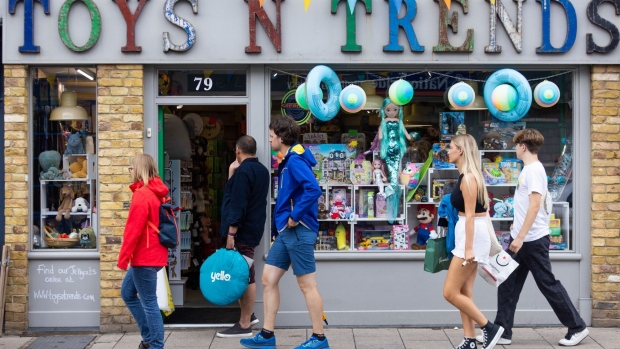Sep 16, 2022
UK Retail Sales Post Biggest Drop This Year as Squeeze Tightens
, Bloomberg News

(Bloomberg) --
UK retail sales fell at the sharpest pace in eight months in August as a worsening cost-of-living crisis and plunging confidence forced consumers to cut back on spending.
The 1.6% drop was more than three times the decline predicted by economists and reflects the squeeze on households from soaring energy bills and inflation near a 40-year high. All retail categories saw sales decline for the first time since July 2021.
The pound extended its drop after the release, and was down 0.4% to $1.1417 as of 9:21 a.m.
The government is responding to the crisis, announcing a £100 billion ($114 billion) subsidy package to stop gas and electricity bills spiking again over the winter. That may be enough to avert a recession, but consumers still face months of hardship amid sharply rising prices of everything from food to clothes. Real wages are dropping, and the the squeeze has sent consumer confidence plunging to a record low.
It’s also meant that many households have to buy fewer discretionary items in order to afford the essentials.
John Lewis Partnership Plc, a bellwether for British retail, said this week its first half loss more than tripled compared with a year earlier, and blamed the “unprecedented cost-of-living crisis.” THG Plc, the online shopping emporium, said earnings would miss guidance.
What Bloomberg Economics Says...
“We expect consumer spending to come under more pressure in the coming months given the unrelenting squeeze on incomes... Discretionary purchases will come under particular pressure and consumers are likely to trade down to cheaper brands where possible when buying food.”
Click here for the full REACT
The retail-sales slump in August left sales 5.4% lower than a year earlier, a fifth straight year-on-year decline. Excluding the earlier days of the Covid pandemic, such a bad streak hasn’t been seen on the British High Street in more than a decade.
UK retail stocks have plunged more than 12% over the past month, making them among the worst performing sector. The FTSE 350 Index as a whole has fallen by 4.4%.
Retail sales are almost certain to act as a drag on the economy in the third quarter. Sales will fall over the period unless September sees a 3.1% surge.
The plight of consumers is unlikely sway the Bank of England, which is expected to keep raising interest rates -- including a possible 75 basis-point hike next week -- in an effort to head off a wage-price spiral.
(Updates with retailers, stocks starting in sixth paragraph)
©2022 Bloomberg L.P.





